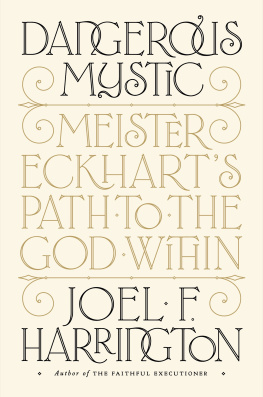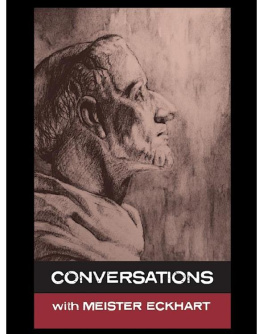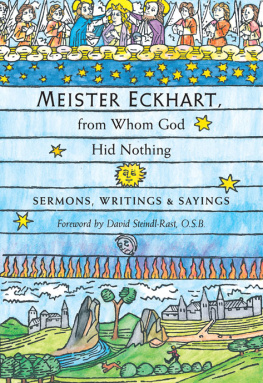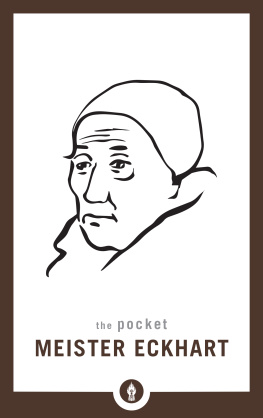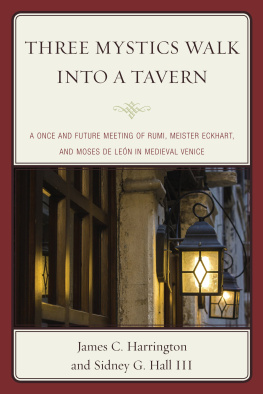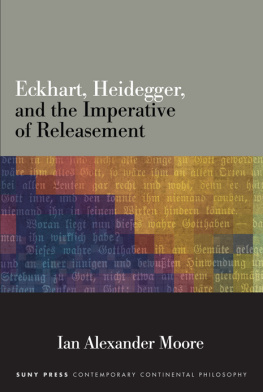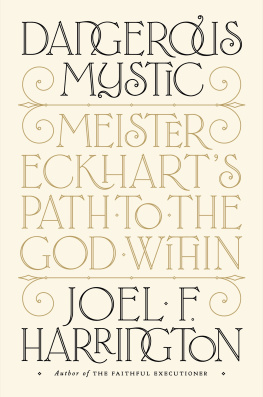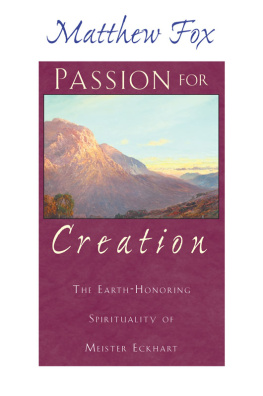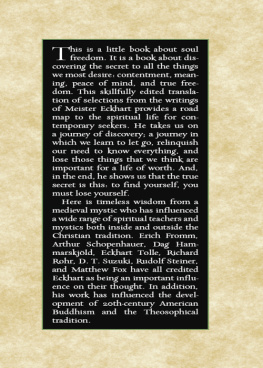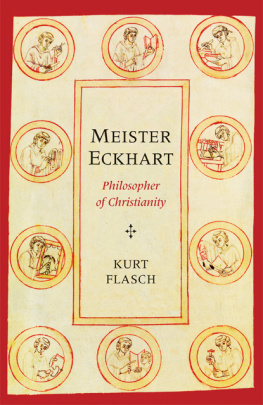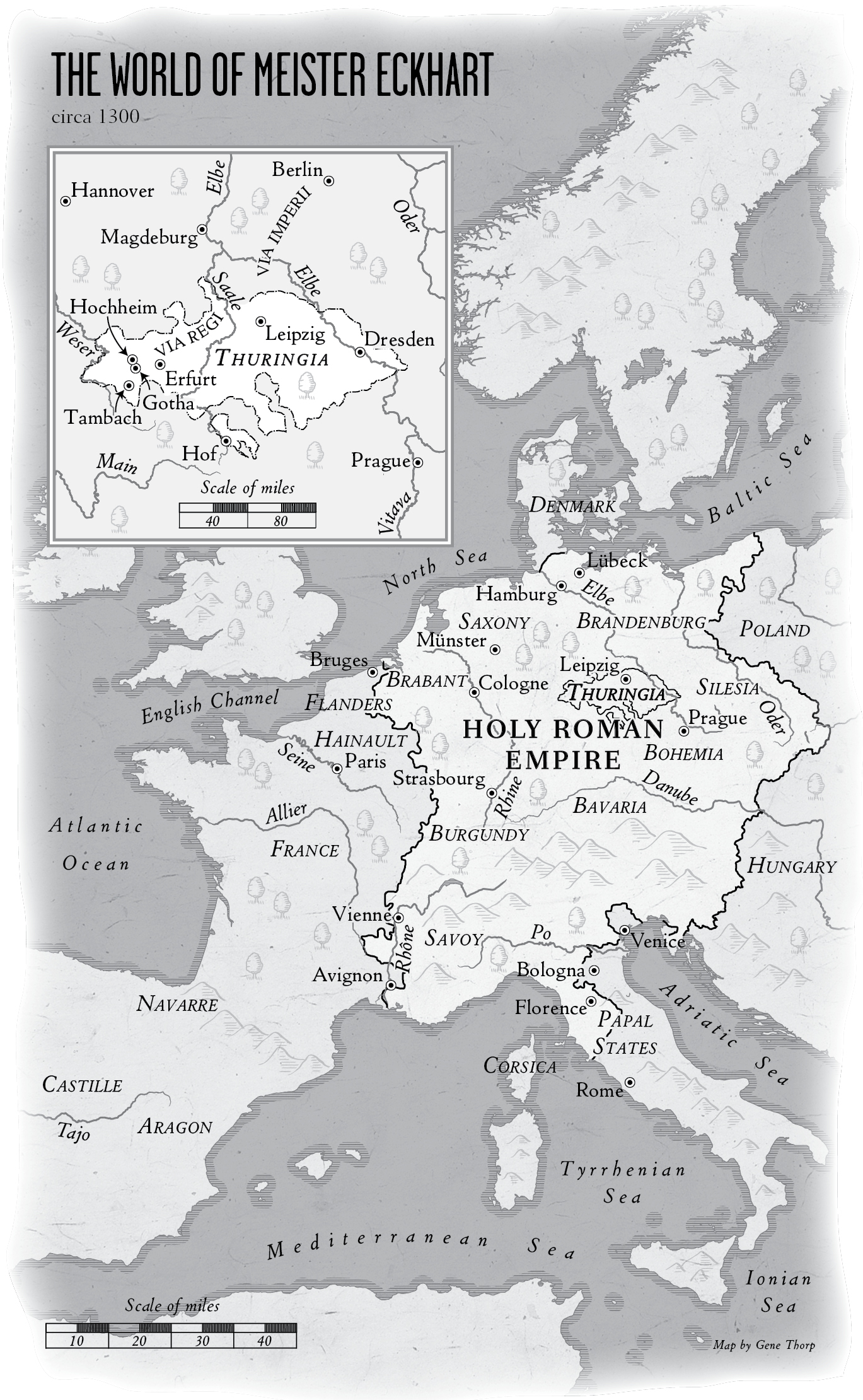TITLES BY JOEL F. HARRINGTON
Copyright 2018 by Joel F. Harrington
Penguin supports copyright. Copyright fuels creativity, encourages diverse voices, promotes free speech, and creates a vibrant culture. Thank you for buying an authorized edition of this book and for complying with copyright laws by not reproducing, scanning, or distributing any part of it in any form without permission. You are supporting writers and allowing Penguin to continue to publish books for every reader.
There are those who seek knowledge for the sake of knowledge; that is curiosity. There are those who seek knowledge to be known by others; that is vanity. There are those who seek knowledge in order to serve; that is love.
Key Names and Terms
ALBERT THE GREAT: aka Albertus Magnus; ca. 120080, a Dominican and the greatest German philosopher of his day
AVERROS: aka Ibn Rushd; 112698; Aristotelian philosopher from Muslim Andalusia
AVICENNA: aka Ibn Sn; 9801037; influential Islamic philosopher from Persia
BEATIFIC VISION: In Christian theology, the face-to-face experience of God; highly disputed whether possible before death
BEGUINE: A member of a community of religious women who do not take formal vows
DIETRICH OF FREIBERG: ca. 1250ca. 1310; Dominican scholar and administrator, also mentor of Eckhart
DISPUTATIO: A formal scholastic debate on a specific theological question
DIVINE BIRTH: aka the eternal birth; according to Eckhart, the direct experience of divine essence in the soul
DIVINE SPARK: According to Eckhart, the piece of divine essence found in every soul
DOMINICANS: aka the Order of Preachers, a religious order founded by Dominic de Guzmn in 1215
ERFURT: Thuringian city and home to Eckhart for most of his life
ESSENCE: In scholastic philosophy, the necessary or defining properties of a thing
FRANCISCANS: aka the Order of Friars Minor, a religious order founded by Francis of Assisi in 1209
FRIENDS OF GOD: Fourteenth-century Rhineland followers of Eckharts mystical teachings
HEINRICH OF VIRNEBURG: 12451332; archbishop of Cologne from 1304 on
INTELLECT: In scholastic terms, the power for conceptual thought, located in the soul
JOHN XXII: Born Jacques Duz; reigned as pope in Avignon 131634
LATERAN IV: Universal church council convened by Pope Innocent III in 1215
LETTING-GO-NESS: Translation of gelzenheit, the necessary precondition to the divine birth
MAIMONIDES: aka Moses ben Maimon; 11351204; Sephardic Jewish philosopher from Cordova
MARGUERITE OF PORETE: Beguine author of The Mirror of Simple Souls; burned as a heretic in 1310
MECHTILD OF MAGDEBURG: ca. 120892; beguine and author of mystical Flowing Light of Divinity
MENDICANT: aka friar, a member of one of the begging orders of Franciscans or Dominicans
MYSTIC: An individual who has directly experienced the divine or ultimate reality
OPUS TRIPARTITUM: The three-volume theological summa planned by Eckhart but never completed
PHILIP THE FAIR: aka Philip IV, reigned as king of France 12851314
PRIORY: A mendicant or monastic house, headed by an elected prior
PSEUDO-DIONYSIUS: Anonymous Christian theologian of the late fifth and early sixth centuries; a major source of medieval mystical thought
ST. JACQUES: The Dominican priory in the Latin quarter of Paris
SCHOLASTIC: A schoolman trained at a university, typically in philosophy or theology
SENTENCES: The influential four-volume theological handbook compiled by Peter Lombard (ca. 10961160)
SPECIES: The scholastic definition of any kind of cognitive representation of a group
SUMMA: A summing up of theological knowledge in one work
HEINRICH SUSO: aka Heinrich Seus; ca. 12951360; a prominent Eckhart disciple
TALKS OF INSTRUCTION: Excerpts from Eckharts discussions with Dominican novices during the years 129498
JOHANNES TAULER: 130061; a prominent Eckhart disciple
TERTIARY: A layman or laywoman who attaches to a religious order without taking permanent vows
THOMAS AQUINAS: aka the Angelic Doctor; 122574; supremely influential Dominican theologian, canonized in 1323
THURINGIA: Landgraviate in central Germany; during Eckharts lifetime ruled by the Wettin dynasty of Meissen
UNIVERSAL: A common concept, like a Platonic form, whose reality scholastics debate
UNIVOCITY: Among scholastics, a property of words whose meanings are identical; an essential component of scientific theology
VIA NEGATIVA: The theological method of knowing God by what He is not
Prologue
The contrast between the setting and the message could not have been starker. The year was 1318; the location, the cathedral of Our Lady in the German city of Strasbourg, during a typical Sunday morning mass. The man about to speak was Eckhart von Hochheim, better known to posterity as Meister (German for Master) Eckhart. Some three hundred men and women sat silently in the wooden pews. A few of them whispered Latin prayers while fingering the recently invented prayer beads known as the garland of roses, or rosary. Most waited in an anticipatory hush, focused on the middle-aged priest solemnly seated on the left side of the altar, the top of his head shaved in the distinctive tonsure of monastic orders, the man himself extravagantly robed in the embroidered green vestments of the liturgical season.
During the extended pause for reflection after the gospel reading, some members of the congregation must have let their eyes wander to the surrounding wonders of the magnificent cathedral. For nearly a century, the earlier church, built in a style later called Romanesque, had been slowly transformed into the French style, known today as Gothic. External flying buttresses and other engineering marvels had enabled the cathedrals builders to shift to tall arches and thin, largely ornamental columns, giving the interior of the church a steep and dramatic thrust upward, toward God. Brightly colored stained-glass windows told stories of the saints and martyrs, while casting rainbow-colored shafts of morning light onto the congregation. The smoke of incense from the masss opening procession lingered in the streaming sunshine, filling the air with its mildly sweet, otherworldly odor.

